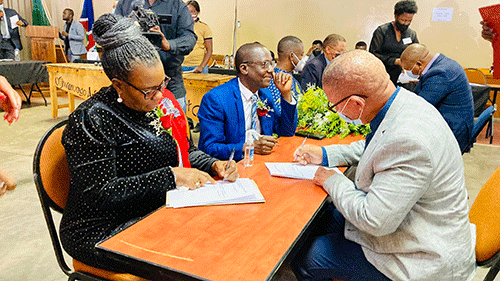The urban and rural development minister Erastus Uutoni yesterday handed over decentralised (delegated) functions of the ministry of education, arts and culture to regional councils at Otjiwarongo in the Otjozondjupa region.
Regional councils will now be responsible for managing libraries, administration offices, teachers’ resource centres, schools, hostels and arts and culture resources and activities in their jurisdiction.
Staff would now report to regional directors who report to chief regional officers.
Uutoni explained that the ultimate goal of decentralisation is to promote the welfare of the citizens by delivering and ensuring access to timely and efficient service as well as by involving the community in the planning and realisation of their development.
Hence, according to him, the functions of arts and culture that are being decentralised are critical in the development of the country and its people.
“The arts and culture sector offers a lot of opportunities and benefits for the society – education, economic, social, health and well-being. Given the noted declining opportunities in the sectors that used to be the traditional or main drivers of employment and growth, sectors such as arts and culture offer great potential and new opportunities for the growth and recovery of our economy,” he clarified.
The minister urged regional governors and councils, with the continued support of the education ministry, to take on these critical functions and execute them in a manner that will nurture their full potential and their contribution to the enhancement of the betterment of the people and society.
He said the role of public institutions that are closest to the citizens, namely
regional and local authorities in the fulfilment of the ideals of the constitution is key.
“This is indeed the reason why the establishment of these institutions has been provided for in the constitution, namely Articles 102, 103 and 111, and this has subsequently seen the enactment of the Regional Councils Act, 1992 as amended and the Local Authorities Act, 1992 as amended, which gave birth to the establishment of regional councils and local authorities. As I have mentioned already, public institutions are created for a purpose and their relevance is assessed based on how well they are serving the purpose for which they were created,” he said.
Speaking at the same occasion was the education minister Anna Nghipondoka who said the education sector has been in favour of decentralisation ever since the adoption of the policy in 1997.
“The education ministry presented its first draft of the Decentralisation Action Plan in 1999, with the intention of decentralising primary and secondary schools, community libraries, adult education, arts and culture programmes and school hostels to the regional councils,” she explained.
She calls for dedicated close collaboration and strengthening of relations among entities.
– ljason@nepc.com.na


